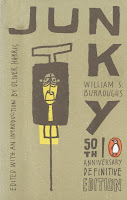 Sometimes Junk proves to be pretty cool. Pictured here is our first edition of William Burroughs' Junkie (New York: Ace Paperback, 1953). This book is a real rarity. Frequently a book is first printed and marketed as "a modern masterpiece sure to become a classic." But so few books do, and most that make the claim when they are first published fade quickly. In the case of Burroughs' first novel, it was originally printed and marketed as ephemeral pulp fiction dos a dos with Narcotic Agent. Burroughs himself distanced himself from the work by publishing it under the name of his alter ego William Lee (our copy is inscribed "William Burroughs for William Lee").
Sometimes Junk proves to be pretty cool. Pictured here is our first edition of William Burroughs' Junkie (New York: Ace Paperback, 1953). This book is a real rarity. Frequently a book is first printed and marketed as "a modern masterpiece sure to become a classic." But so few books do, and most that make the claim when they are first published fade quickly. In the case of Burroughs' first novel, it was originally printed and marketed as ephemeral pulp fiction dos a dos with Narcotic Agent. Burroughs himself distanced himself from the work by publishing it under the name of his alter ego William Lee (our copy is inscribed "William Burroughs for William Lee"). Fifty years later, it was a modern masterpiece on its way to becoming a classic. The contrast between the first edition and the 2003 Penguin edition could not be much more stark. The "Confessions of an Unredeemed Drug Addict" had become "The Definitive Edition of Burroughs' Seminal First Novel" with lots of scholarly apparatus: an extended introduction by Oliver Harris (with footnotes!), seven appendixes, including a variant of Chapter 28, and a glossary. The spelling of the title was restored to Burroughs' original, the title page references the manuscript title "Junk" and the Burroughs' name appears prominently on the title page and cover.
Fifty years later, it was a modern masterpiece on its way to becoming a classic. The contrast between the first edition and the 2003 Penguin edition could not be much more stark. The "Confessions of an Unredeemed Drug Addict" had become "The Definitive Edition of Burroughs' Seminal First Novel" with lots of scholarly apparatus: an extended introduction by Oliver Harris (with footnotes!), seven appendixes, including a variant of Chapter 28, and a glossary. The spelling of the title was restored to Burroughs' original, the title page references the manuscript title "Junk" and the Burroughs' name appears prominently on the title page and cover. It is interesting to think about how someone who had never heard of the book would approach these two editions: my guess is that if they hit a line in the 1953 edition that didn't make sense they would say, "This William Lee is a bad writer," but if they hit the same line in the 2003 edition, they might worry, "Maybe I am not smart enough to understand this book..." One privileges the reader, the other the writer.
It is interesting to think about how someone who had never heard of the book would approach these two editions: my guess is that if they hit a line in the 1953 edition that didn't make sense they would say, "This William Lee is a bad writer," but if they hit the same line in the 2003 edition, they might worry, "Maybe I am not smart enough to understand this book..." One privileges the reader, the other the writer.To see the original pulp fiction "classic" ask for Rare PS3552.U75J86.








